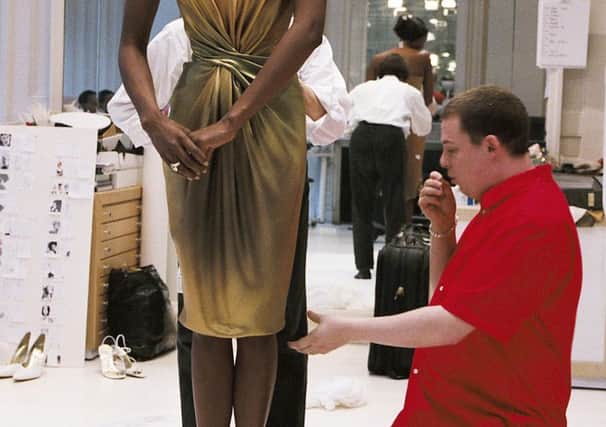Film reviews: McQueen | That Summer | The Boy Downstairs


McQueen (15) ****
That Summer (12A) ****
The Boy Downstairs (12A) ***
There’s a brief moment in McQueen, Ian Bonhôte and Peter Ettedgui’s documentary about the late fashion designer Lee Alexander McQueen, that captures the curious relationship between celebrity and couture. After his first solo show makes him an overnight sensation, archival footage shows McQueen being interviewed for TV with the camera to his back so no one can see his face. The hot new designer isn’t trying to create any Banksy-style mystique here. Nor is he making a point about the incongruity of a burly, overweight South London kid like him suddenly being the new darling of an industry associated with promoting unattainable ideals of beauty. He’s feigning camera shyness because he’s yet to make any money from his designs and doesn’t want this first flurry of media attention to jeopardise his ability to sign on.
It was this ability to repeatedly make something out of nothing that ensures the story of McQueen’s rise is as irresistible as his suicide in 2010, aged 40, is tragic. The son of a taxi driver and a teacher, he built his career on chutzpah, talent and hard work: banging on the doors of Savile Row tailors until one of them gave him an apprenticeship; ditching an early job at Red or Dead to do the same in Milan; talking his way onto a masters course at Central St Martin’s School of Art when he didn’t have any qualifications; using his middle name as an easy way of bestowing grandeur on the company he was trying to build; grabbing headlines with clothes fashioned from bin bags and market stall fabric because he had nothing else at his disposal… his is a literal rags to riches story and the riches – when they did come – were certainly plentiful.
Advertisement
Hide AdAlong with the YBAs and Britpop, McQueen and his macabre, controversial designs – inspired by subjects such as Jack the Ripper and the Jacobite Rebellion (the latter a way for him to explore his Scottish heritage) – have become synonymous with the cultural landscape of Cool Britannia and he capitalised on his early notoriety by taking a high-profile creative director role at French fashion house Givenchy. The film is great at charting this rush of creative energy, especially as it zeroes in on both the young team he took with him and his friendship with fashion maven Isabella Blow, whose patronage helped push him into the limelight before things soured between them amid the pressure he put on himself to stay radical in an increasingly corporate environment.
But as with so many of these too-much, too-soon tales of talented artists thrust into the mainstream, McQueen’s story also follows the familiar contours of suddenly public figures who find in success a poor roadmap for negotiating the various mental health issues that, with hindsight, are blatantly signposted in their work. Like Amy and Cobain: Montage of Heck, the film mixes shaky home-movie footage with present-day reflections from friends, colleagues and family members in order to track the changes in his attitude and appearance – when liposuction, drug use and, latterly, HIV, took its toll on his physique. It also juxtaposes this material with the violent themes of his work, suggesting that much of his mental anguish is traceable to the abuse he both witnessed and suffered as a child. Yet in structuring the film around his most pivotal shows, the directors slyly indict the superficiality of an industry that couldn’t bear to look at the real McQueen, an industry that missed his cries for help even when those cries came from a catwalk two feet away.
A prequel of sorts to the Maysles brothers’ landmark 1975 documentary Grey Gardens, That Summer picks up the story of Jackie Kennedy Onassis’s eccentric aunt and cousin, ‘Big Edie’ and ‘Little’ Edie Bouvier Beale, three years earlier, just as council officials in their super-plush East Hamptons village are trying to evict them from their derelict mansion. The film is based on thought-to-be lost footage shot by Jackie O’s younger sister Lee Radziwill and American photographer Peter Beard. Radziwill wanted to make a film about her and Jackie’s childhood in the Hamptons but apparently pulled the plug on the project when the Maysles, who’d been hired as crew members, suggested making Edie and Edie the focus. What remains, though, are four reels of extraordinarily intimate footage of these remarkable women as they reckon with a strange form of gentrification: essentially an attempt by the monied elite to eradicate the old aristocracy defiantly living in bohemian squalor long after the money has dried up. Swedish director Göran Hugo Olsson, who specialises in making documentaries from found footage like this (see The Black Power Mix Tape 1967-1975), re-contextualises Beard’s footage by bookending it with reminiscences from the artist himself about his life in the nearby bohemian enclave of Montauk, turning the film into an impressionistic study of a moment in time in which the promise of the previous decade was being unceremoniously eroded.
British/American director Sophie Brooks unapologetically filters Lena Dunham’s Girls through the lens of Nancy Myers in The Boy Downstairs, a New York-set millennial romcom about an aspiring writer (Girls star Zosia Mamet) who unintentionally moves into the same impossibly nice brownstone as her ex (Matthew Shear) three years on from an uncomfortable break-up. What follows is fairly inconsequential, but not unpleasant, so long as you can get past the relentless on-screen hugging and Mamet’s irritating vocal fry. ■